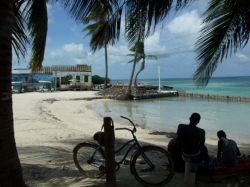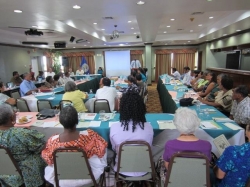 Last week I was in Belize to launch a study on the feasibility of a universal pension. We produced the study with support from our affiliate HelpAge Belize and in collaboration with the National Council on Ageing, Belize.
Last week I was in Belize to launch a study on the feasibility of a universal pension. We produced the study with support from our affiliate HelpAge Belize and in collaboration with the National Council on Ageing, Belize.
Belize is an interesting case in terms of social pensions. In 2003, following an election pledge, the government introduced what was meant to be a universal pension to all women over 65 years. The idea was to make up for the fact that few women in Belize had been able to save for old age.
Most older people still without regular pension
When it came to implementation, however, funding constraints meant that the pension was just targeted at those most in need. In 2007, the pension was extended to men over 67 years, but the means test remained for both men and women.
The pension currently gives BZ$100 (US$50) per month to eligible older people, which provides a lifeline for those that receive it, cutting the poverty rate of recipient households by 20%. Nevertheless, coverage of the scheme is low and most older people in Belize still have to get by without any regular pension.
The test used to determine eligibility for the NCP is also inaccurate. This means that around half of the poorest older people miss out while many better-off older people are included.
Poverty rate increasing in Belize
Our report looked at how feasible it would be for Belize to follow the original idea behind the social pension, and implement it universally.
We started by looking at the potential impact of a universal pension. The context is that poverty rate in Belize has been on the rise over the last decade, increasing from 34% in 2002 to 41% in 2009. Meanwhile, people living in households where there is an older person are poorer than average.
Poverty simulations in the study show that a universal pension could significantly reduce the poverty of such households. But it could also reverse the trend of rising poverty of all households and take national poverty levels a third of the way back to where they were in 2002.
Cost of pension would be low
It appears that the cost of a universal pension would be relatively low. A universal pension for everyone over 70, for example, would cost just 0.5% of GDP – only 2% of government expenditure.
A more generous option to everyone over 60 years with a higher benefit of BZ$160 (US$80) would cost 1.7% of GDP. This would obviously be a bigger cost to accommodate, but is still only around the cost of the current public service pension which covers just 7% of older people.
Strengthening the voices of older people

A universal pension looks like a cost-effective option for tackling old-age poverty in Belize while forming a strong component of a wider social protection system. However, the question now is one of political commitment from the government.
The main task now is to help strengthen the voice of an already vocal older population. This is set to continue through the work of HelpAge Belize and the National Council on Ageing.
Click here to download a full version of the report The feasibility of a universal pension in Belize.
